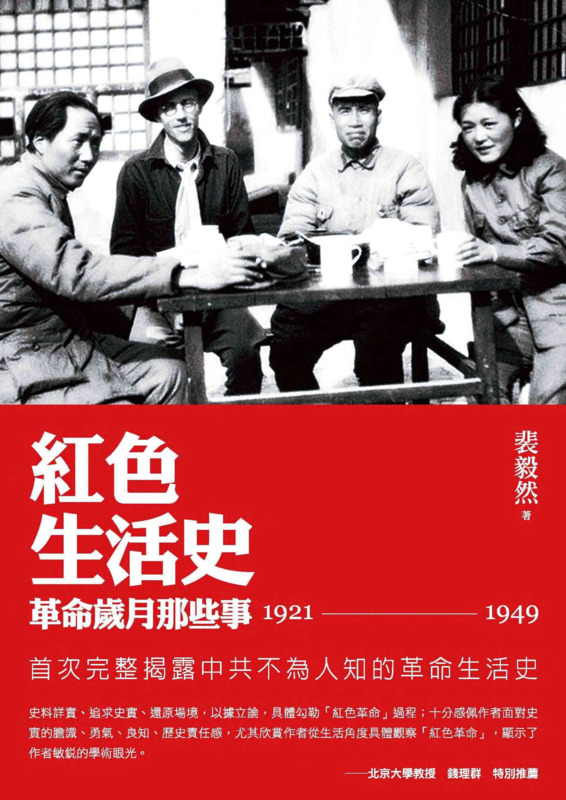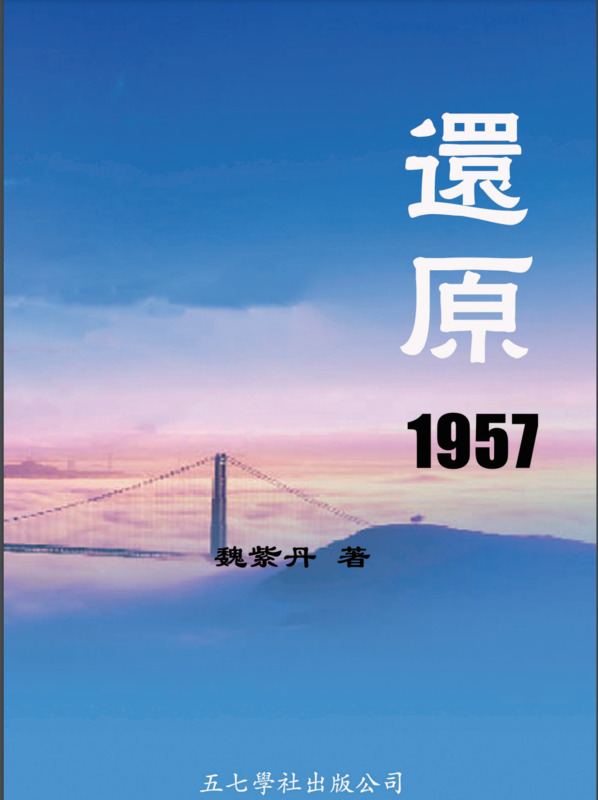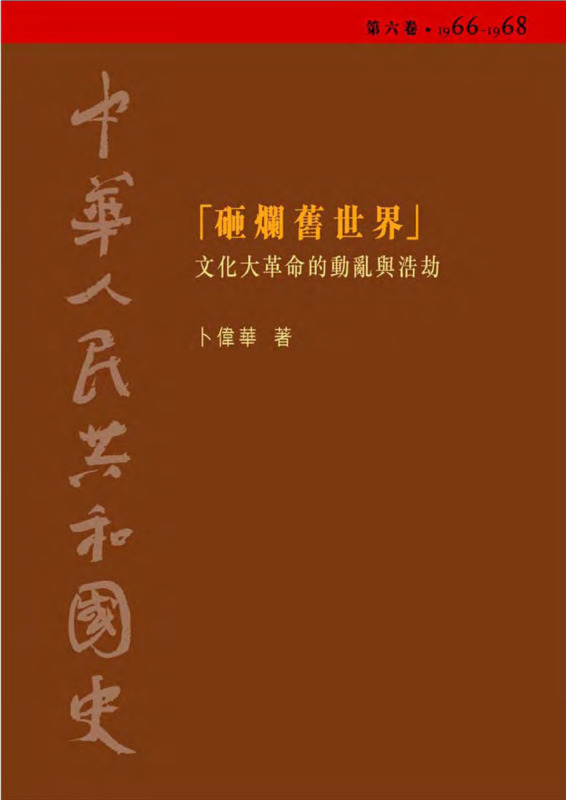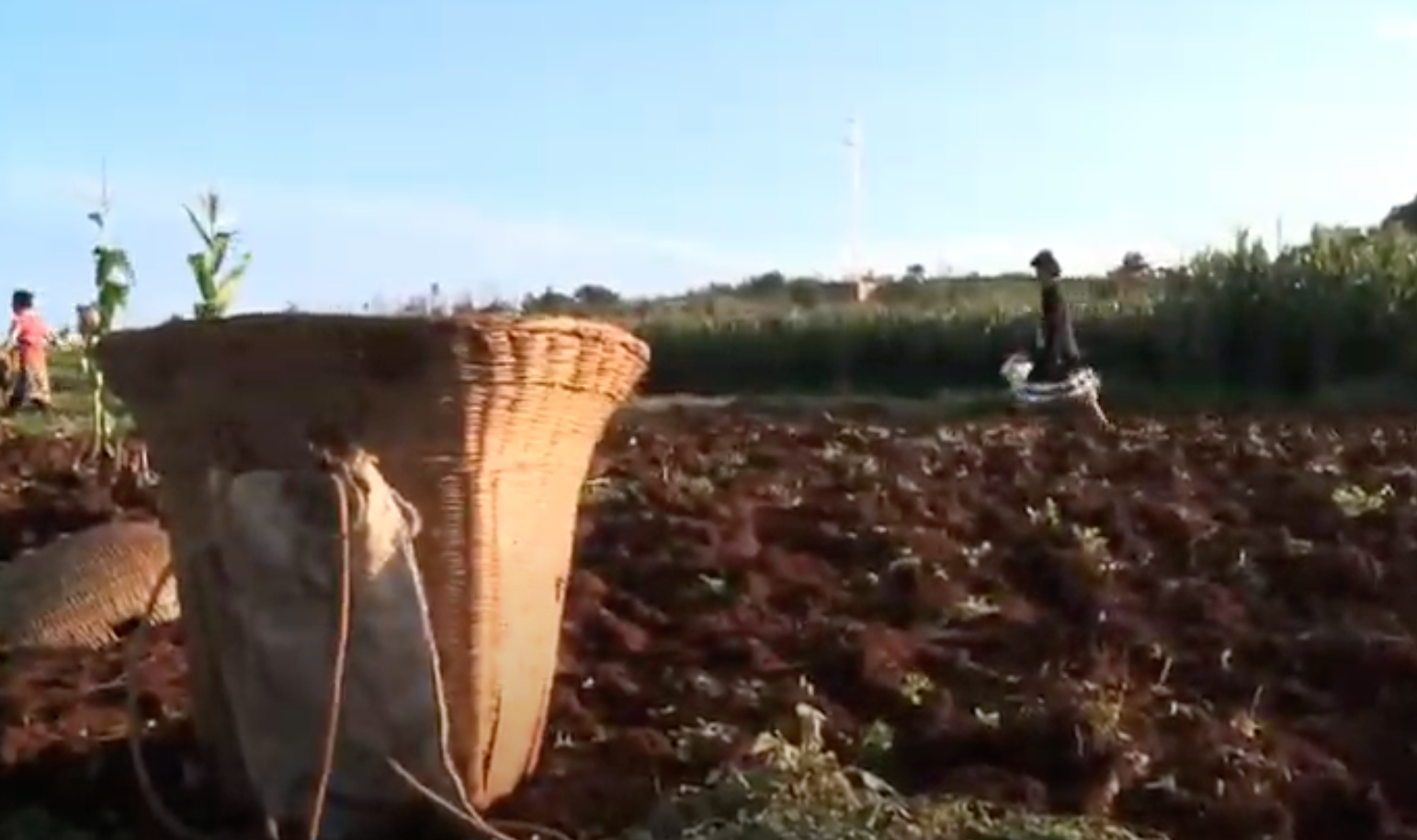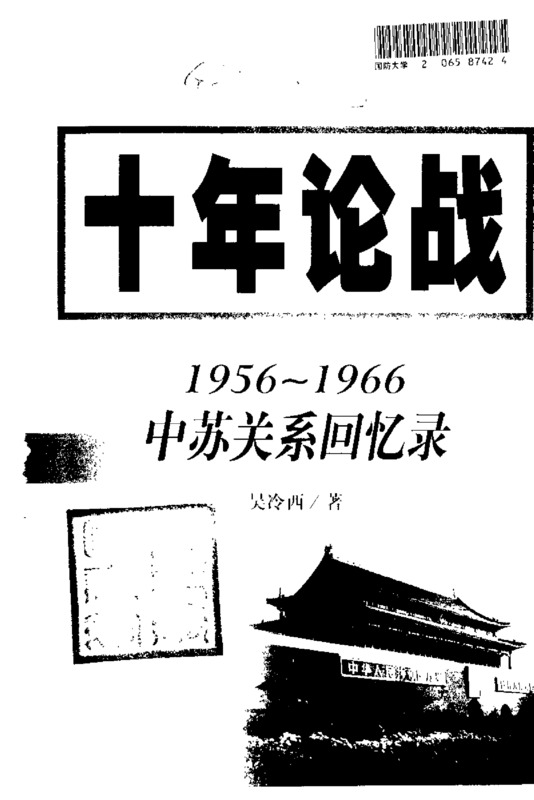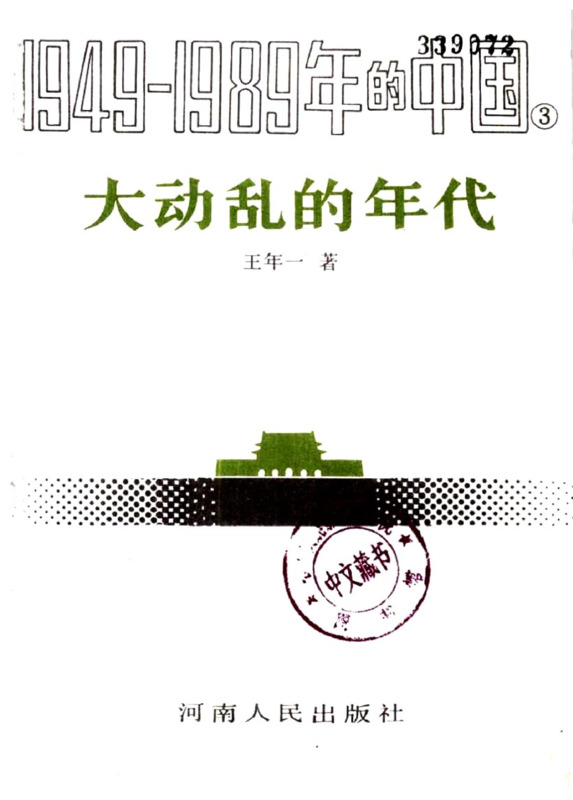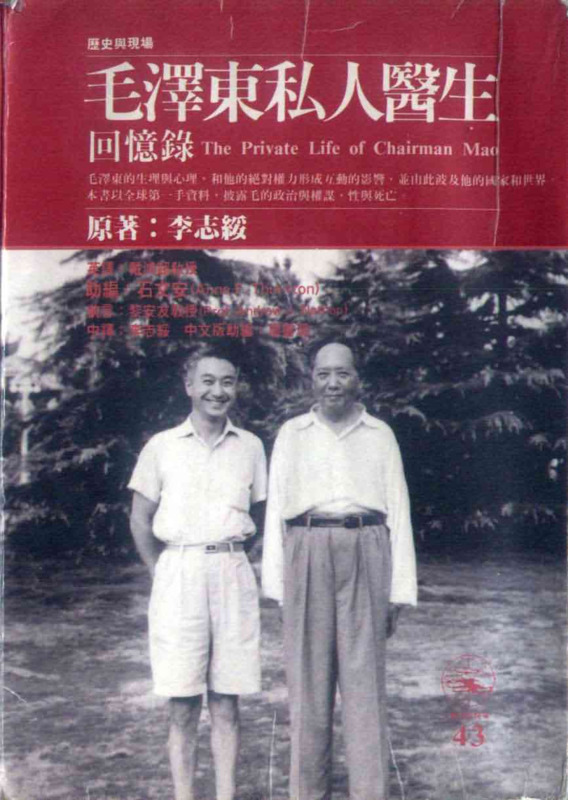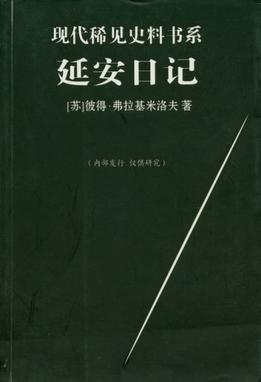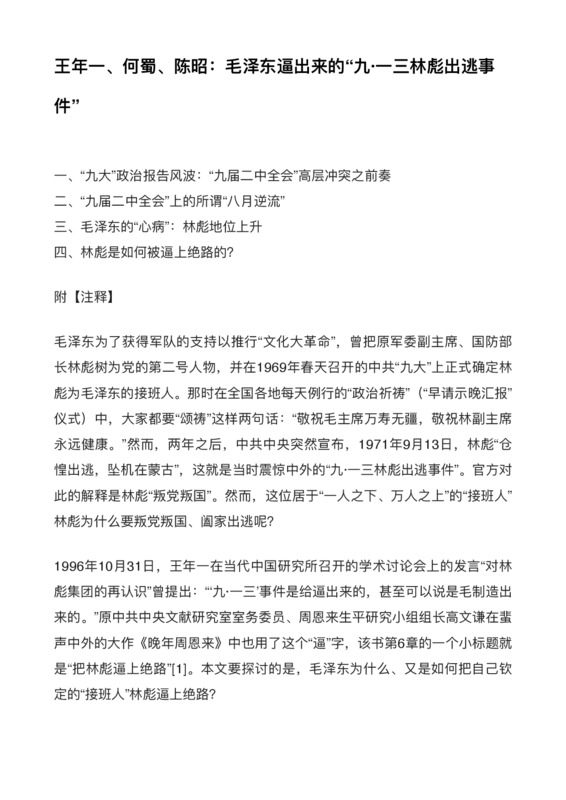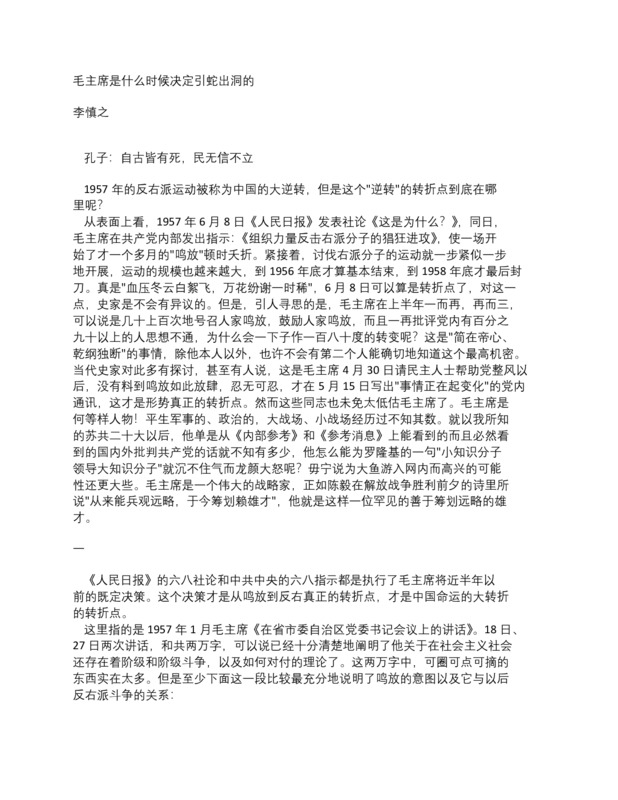Explore the collection
Showing 45 items in the collection
45 items
Book
Red Life History - The Revolutionary Years (1921-1949)
Professor Pei Yiran's book is the first complete revelation of the untold revolutionary history of the CCP. The book covers many important points in the history of the CCP, including the use of Soviet rubles to build the party, the landlords fundraising campaign, and the love life of Mao Zedong and Jiang Qing, among subjects.
Book
Revisiting 1957
<i>Revisiting 1957</i> is not just about the history of the Anti-Rightist Campaign but is also a theoretical reflection on that history. Written by Wei Zidan (the penname for Wei Liyan), the book has three sections: upper, in which the author discusses philosophical problems of the campaign; middle, in which he discusses the origins of the campaign; and lower, which contains his thoughts on lessons for the future. In Wei's view, the people who were declared rightists stood up for freedom of speech. The campaign, therefore, was an assault on freedom of expression and resulted in a human rights catastrophe for China. The book also has an eleven-part appendix with reflections on miscellaneous events.
Wei Zidan was born in Henan Province in 1933 and was a teacher in the Anyang Middle School. He himself was labeled a rightist and brings a unique insider's account of the movement but unlike some personal accounts of suffering, Wei also brings a more analytical approach to the issue.
After moving to the United States in his later years, he collected information and found the freedom to complete this book. Published in Hong Kong in 2013 by the May 7 Society Press.
Book
Seventy Years of the Chinese Communist Revolution
Professor Chen Yongfa's book examines the history of the Chinese Communist Party from the perspective of modern Chinese history. It divides it into three stages: revolutionary seizure of power, continuous revolution, and farewell revolution. It delves into three major issues in CCP history: nationalism, grassroots power structure, and ideological transformation and control. published by Taiwan's Linking Publishing in 2001.
Book
Sky Burial: The Fate of Tibet
In this book, author Wang Lixiong presents his arguments with a great deal of personal experience and field work. The book covers the history of the Tibetan issue, the current situation, and various aspects. The book was first published by Mirror Books in Hong Kong in 1998, and an updated edition was released in 2009.
Book
Smashing the Old World: The Turmoil and Havoc of the Cultural Revolution
This volume is authored by Bu Weihua. Bu Weihua was the originator of the Red Guards and the Red Guard movement. He became a member of the Red Guards at Tsinghua High School. After the end of the Cultural Revolution, he received professional training in history and was one of the first scholars in China to engage in the study of the Cultural Revolution. He not only understands the pre-Cultural Revolution period, especially the Red Guard movement in Beijing, but also has deep reflections on the catastrophe he experienced. This volume concisely depicts the panoramic images and processes of the Cultural Revolution from May 1966 to April 1969.
Film and Video
Songs of Maidichong Village, The
This film was shot in a village called Maidichong in the mountains of Yunnan Province. The village is inhabited by a community of Miao people who are Christians. 100 years ago, the British missionary, Mr. Burghley, came to this village, fostered the Miao language, and brought faith, education, and medical care to the Miao people. This movie tells this history and how their journey of faith was brutally suppressed during the Cultural Revolution. It also presents the challenges they face today.
Book
Summer of 1957: From One Hundred Schools of Thought to Two Schools of Thought
This book comprehensively records and analyzes the Anti-Rightist Campaign.
The author Zhu Zheng was born in 1931. He was once the editor of Hunan People's Publishing House and a well-known expert on Lu Xun in China. He was classified as a Rightist in 1957 and personally experienced the Anti-Rightist Campaign. This book references information from CCP party newspapers at that time, as well as his recollections, making this book informative and reliable.
The "two dueling schools of thought" in the subtitle of this book comes from The Selected Works of Mao Zedong. Mao called for one hundred schools of thought to contend but in fact only intended for two to compete: the bourgeoisie and the proletariat.
This book was first published by Henan People's Publishing House in 1998. It is one of the earliest studies of the movement in China.
Book
Ten Years of War: A Memoir of Sino-Soviet Relations 1956-1966
The author of this book explains the relations between the two parties before and after the 1956-1966 Sino-Soviet War and the main process of the Sino-Soviet War as a first-hand witness. Since Stalin's death and Khrushchev's rise to power, Sino-Soviet relations have been characterized by a series of exchanges over the internal relations between the socialist party and the socialist country, the relations with the "imperialists", how to build socialism, and the national question. As a personal witness to this period, the author tells the truth about history as he knows it. This book was originally published on the mainland in 1993.
Book
The Age of Great Unrest: China 1949-1989
The author of this book, Wang Nianyi (1932 - September 13, 2007), was an expert on the history of the Cultural Revolution. He has a clear understanding of the causes and circumstances of the Cultural Revolution. He is regarded as doing "pioneering work" in China's domestic study of the Cultural Revolution. According to Qizhi's recollection, Wang Nianyi compiled <i>Chronicle of the Cultural Revolution</i>, <i>The First Year of the Cultural Revolution</i>, <i>Dictionary of the Cultural Revolution</i>, <i>Miscellaneous Discourses on the Cultural Revolution</i>, and <i>Research Materials on the Cultural Revolution</i>, which have not been published in China.
Book
The Doubtful Clouds of 1957-- Cracking the Code of the Anti-Rightist Movement
The Anti-Rightist Movement in China began in 1957 with the reorganization of intellectuals, followed by the Great Leap Forward, the People's Commune, and a series of calamities such as the Great Famine. The Hong Kong Five Sevens Society was founded in 2007 with the aim of collecting, organizing, and researching historical information about the Anti-Rightist Movement. It is headed by Wu Yisan, a writer who moved to Hong Kong from mainland China. The author of this book, Shen Yuan, who was also a Rightist at the time. He has systematically researched and organized the Anti-Rightist Movement that took place in 1957 and attempted to answer some of the unanswered questions.
Book
The Great Leap Forward: An Intimate Memoir
Li Rui, who once served as Mao's secretary, is also an expert on Mao Zedong. Like his famous <i>Proceedings of the Lushan Conference</i>, this book is also an important historical work. It focuses on the author's personal experience of the Great Leap Forward initiated by Mao Zedong.
Book
The Private Life of Chairman Mao
Author Li Zhisui served as Mao's medical team leader and was the first director of the PLA's San 105 Hospital. This book is a memoir that he wrote. It details Li Zhisui's information from 1954, when he started as Mao's personal physician, to 1976, when Mao died, a period of 22 years. In his writing, Mao's private life is extremely absurd and touches on all aspects of the struggle against some of the CCP's personnel. After the book was published in Taiwan, it was completely banned on the mainland.
Originally written in English, the book was translated into English by Hongchao Dai, former head of the political science department at the University of Detroit, with a foreword by China expert Andrew James Nathan, and with Anne F. Thurston as an assistant editor. was published in English by Blue Lantern Books in 1994. The Chinese edition was translated from the English with the assistance of Shushan Liao and published by Taiwan Times Culture in 1994. Lee died in the United States in February 1995, six months after the book was published.
Book
The Realm of Historiography
This book is a compilation of some of Gao Hua's speeches, book reviews, commentaries on current affairs, reviews of student papers, and lecture transcripts. It includes his studies and reflections on themes around revolution, civil war, and nationalism, his comments on the works of Long Yingtai, Wang Dingjun, and Mao Zedong, and his observations on Taiwan's social and political realities during his visits to Taiwan. In addition, the book contains a selection of Gao Hua's lecture notes on the theory and methodology of historiographical research, as well as on the production of official historical narratives and the development of folk history, enabling readers to gain further understanding of the philosophy and methodology behind Gao Hua’s research.
The book was published by Guangxi Normal University Press in November 2015 before the fourth anniversary of Gao Hua's death, for which the publisher was disciplined by the Central Propaganda Department and the State Administration of Press, Publication, Radio, Film and Television.
Book
The Vladimirov Diaries: Yenan, China 1942~1945
The author of The Vladimirov Diaries: Yenan, China, 1942~1945, Peter Vladimirov (Sun Ping in Chinese) was a Soviet citizen. The book was first published in the 1980s by Oriental Publishing House and reprinted in March 2004. Peter traveled to Yan'an from 1942 to 1945 as a liaison officer of the Comintern and a correspondent for the TASS news agency. He kept a diary of the political, economic and cultural aspects of Yan'an, including its opium economy. Against the background of the relationship between the CCP and the Soviet Union during the War of Resistance against Japanese Aggression, the book describes the CCP's Rectification Movement and the Seventh National Congress. It also comments on the CCP's contact with the U.S. Military Observer Group stationed in Yan'an at the time and on the relationship between the CCP and the Kuomintang.
Book
Thirty Years of New China
Tang Degang is a historian and biographer who specializes in oral history. In the latter half of his life, he settled in the United States and taught at Columbia University and the City University of New York. In the field of history, he put forward the "Three Gorges Theory of History", which divides the change of Chinese social system into three major stages: feudalism, imperialism, and civil rule. The book was originally titled <i>Mao Zedong's Dictatorship, 1949~1976</i>, but was renamed <i>Thirty Years of New China </i> when it was released on the mainland.
Book
Tibet in Agony: Lhasa 1959
Traveling Chinese history scholar Li Jianglin began working on the Tibet issue in 2004. She has traveled to India every year in search of Tibetan refugees, visited 14 Tibetan refugee settlements in India and Nepal, contacted more than 200 exiled Tibetans from the three regions of Tibet, and personally interviewed the Dalai Lama in Dharamsala, the seat of the Tibetan government-in-exile, in 2008. In 2010, Li Jianglin completed her book <i>Lhasa 1959!</i> by drawing on interviews, information searches, and rare historical photographs provided by the Tibetan government in exile, in the hope of reconstructing the little-known history of the Dalai Lama's departure from Tibet in 1959. The book was published by Taiwan's Lianjing Publishing House in 2010 and reprinted in 2016.
Article
Wang Nianyi, He Shu, and Chen Zhao: Mao Zedong's "September 13th Lin Biao Escape Incident"
Wang Nianyi is an expert on the history of the Cultural Revolution in China. Early on, he suggested that Lin Biao's defection was forced by Mao Zedong. This has long been considered a taboo view in China.
Article
When did Chairman Mao decide to lure the snakes out of their holes?
This is an important article in Li Shenzhi's *Collected Writings*, which analyzes in detail why Mao Zedong wanted to "oppose the right," and how he launched the "anti-right" campaign.
